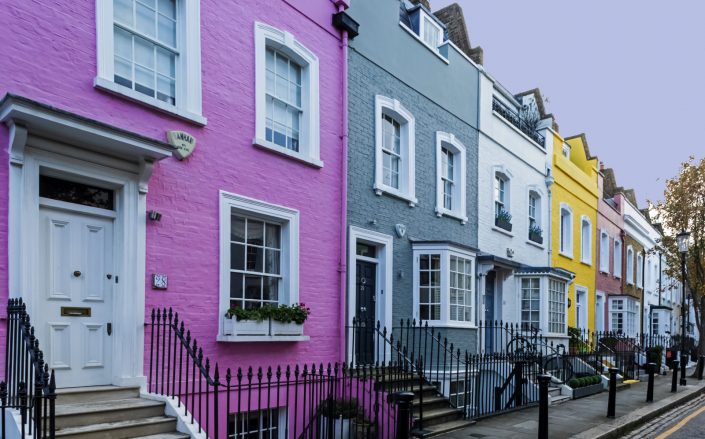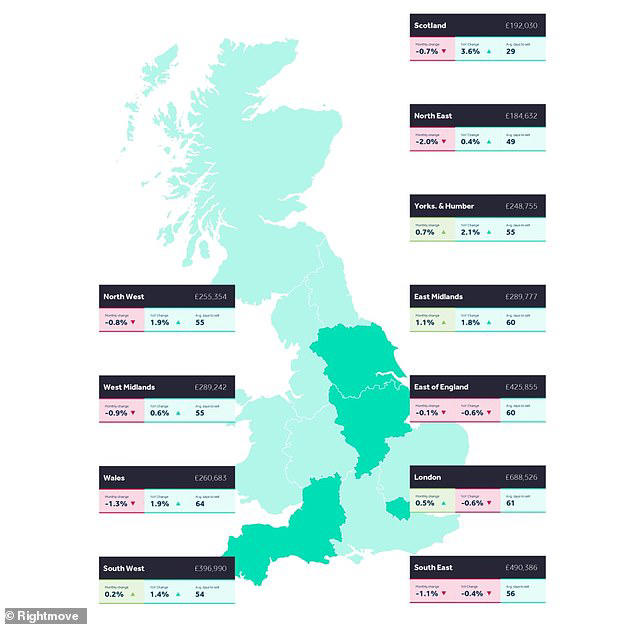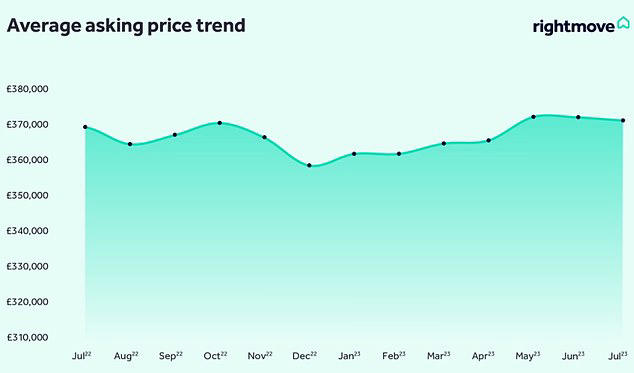Asking prices have edged up 2.6% since the start of the year
Optimistic home sellers have continued to raise asking prices this year, despite the rate crunch that has added hundreds of pounds to monthly mortgage bills. Property listing giant Rightmove said although asking prices rose annually at the slowest pace since the end of 2019, they were still going up.
The average price of newly-listed homes coming to market rose by 0.5%, to £371,907, in the year to July - and is up 2.6% since the start of the year. But many sellers are proving to be overly confident as there has been a rise in the number of properties seeing asking prices cut after they initially go on the market and fail to sell.
London, the East and South East were the only regions to see prices fall compared to last year
© Provided by This Is Money
Buyers have been forced to lower their expectations amid rising mortgage rates that have added hundreds of pounds to the monthly cost of buying the same priced property as last year. The hardest hit areas are those were house prices are highest and buyers most stretched.
Rightmove said prices have proved more resilient than expected, but that surging mortgage rates were now beginning to weigh on the property market. "While prices and sales bounced back this year much more strongly than most expected, the unexpectedly stubborn inflation figures and the surprise of further mortgage rate rises when many felt that they had stabilised, have contributed to the fall in prices and number of sales agreed. The interest-rate brakes being applied more strongly to slow the economy are now beginning to bite in the housing market," said Rightmove's director, Tim Bannister.
Rightmove said that asking prices fell slightly, by 0.2%, on a monthly basis, compared to zero growth in June and this was marginally below the usual stagnation seen at this time of year. Rightmove's comments echo the latest survey by the Royal Institution of Chartered Surveyors, which found that buyer interest, sales and property prices suffered in June as mortgage rates continued to rise.
June saw new buyer enquiries reach an eight-month low, pointing to a 'renewed deterioration' in the UK sales market, the Rics said.
Meanwhile, Britain's biggest mortgage lender Halifax revealed that house prices fell at their fastest rate in 12 years this month, dropping £7,500 on average over the past year.
Rightmove said prices have proved more resilient than expected, rising by 2.6% since January
© Provided by This Is Money
Rightmove's report shows sales agreed are now 12% behind 2019's more normal market level, contrasting with the surprisingly strong first five months of the year. However, buyer demand has remained resilient, rising 3% compared to the same period in 2019.
Rightmove said that estate agents are reporting that right-priced homes are still attracting buyers due to the shortage of property for sale compared to historic norms.
Tim Bannister, of Rightmove said "the interest-rate brakes being applied more strongly to slow the economy are now beginning to bite in the housing market. First-time buyers, trader-uppers and downsizers with higher deposits and lower mortgage requirements appear to be still keenly searching the market, not wanting to miss out on the right property that is not over-priced and that they can still afford."
Bigger homes have proved harder to shift, with agreed sales for second-stepper homes and top-of-the-ladder homes some 14% behind last year.
In comparison, sales for smaller two-bed homes fared better, falling by a smaller 9%.
Bannister said "the continuing twists and turns of persistent inflation and higher mortgage rates have posed some additional challenges for the market. Agents report that some movers are pausing until there is more certainty that mortgage rates have stabilised, as well as reviewing how higher costs affect their plans."
On a regional basis, London, the East and South East were the only regions to see prices fall compared to last year, with falls between 0.4% and 0.6%.
The fastest annual growth was in Scotland, where average asking prices surged by 3.6%, followed by Yorkshire and the Humber with 2.1% growth.



